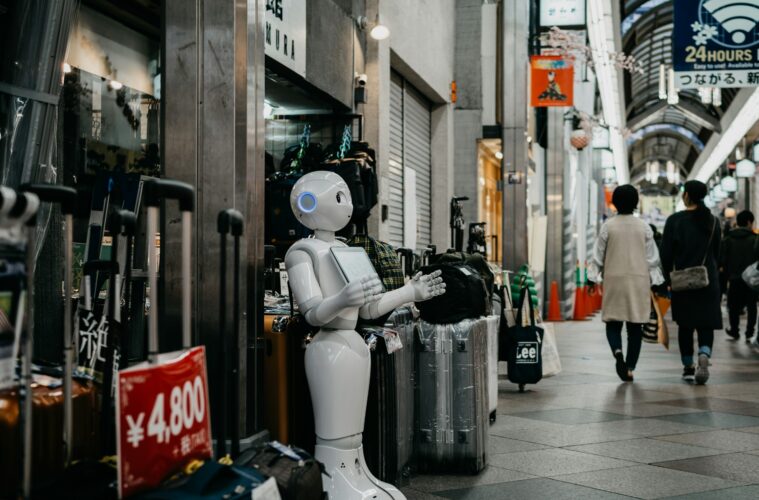The rapid advancement of Artificial Intelligence (AI) has sparked widespread speculation about its potential to disrupt the job market. From manufacturing to finance, AI technologies are increasingly being integrated into various industries, automating tasks that were once performed exclusively by humans. As AI continues to evolve, the question on many people’s minds is whether it will ultimately replace human workers, leading to widespread job loss and economic upheaval. In this article, we delve into the complex dynamics of AI and its impact on employment, examining both the challenges and opportunities it presents.
Will AI Take Our Jobs
The Rise of AI in the Workplace:
AI has permeated almost every aspect of modern life, revolutionising the way we work, communicate, and interact with technology. In the workplace, AI-driven systems are being used for tasks ranging from data analysis and customer service to logistics and healthcare. Machine learning algorithms can process vast amounts of data at incredible speeds, making them invaluable tools for optimising processes and improving efficiency.
Opportunities Created by AI:
While the rise of AI undoubtedly poses challenges to the traditional job market, it also creates new opportunities for innovation and growth. One of the key arguments in favour of AI is its ability to augment human capabilities rather than replace them entirely. By automating routine and mundane tasks, AI frees up human workers to focus on higher-value activities that require creativity, critical thinking, and emotional intelligence.
Moreover, the development and deployment of AI technologies require a skilled workforce to design, implement, and maintain them. This has led to the emergence of new job roles in fields such as data science, machine learning, and AI ethics. As organisations invest in AI initiatives, there is a growing demand for professionals who can harness the power of AI to drive innovation and solve complex problems.
Challenges and Concerns:
Despite the potential benefits, the widespread adoption of AI raises legitimate concerns about job displacement and economic inequality. Studies suggest that certain occupations, particularly those involving routine and predictable tasks, are more susceptible to automation. This includes jobs in manufacturing, transportation, and administrative support.
Furthermore, there is a risk that AI-driven automation could exacerbate existing inequalities, widening the gap between those who possess the skills needed to thrive in a digital economy and those who do not. Without adequate measures to reskill and upskill workers, there is a danger of mass unemployment and social unrest.
Ethical and Societal Implications:
Beyond the economic ramifications, the proliferation of AI raises profound ethical and societal questions. Concerns about data privacy, algorithmic bias, and the ethical use of AI have become increasingly prominent as AI technologies become more pervasive. Biased algorithms, for example, can perpetuate discrimination and exacerbate social inequalities.
Moreover, the prospect of AI systems taking on roles traditionally held by humans, such as caregivers and educators, raises questions about the nature of work and human identity. While AI can enhance efficiency and productivity, it lacks the empathy, intuition, and moral judgment inherent in human interactions. Striking a balance between automation and human involvement is essential to ensure that technological advancements serve the collective good.
Navigating the Future of Work:
As we stand on the brink of a technological revolution, it is imperative that we adopt a proactive approach to address the challenges and opportunities presented by AI. Governments, businesses, educational institutions, and civil society must work together to develop policies and initiatives that promote inclusive growth, foster lifelong learning, and mitigate the negative consequences of automation.
Investments in education and training programs are essential to equip individuals with the skills needed to thrive in a digital economy. By emphasising critical thinking, problem-solving, and adaptability, educational institutions can prepare students for the jobs of the future and empower them to harness the potential of AI technologies.
Furthermore, organisations must prioritise ethical considerations in the design, development, and deployment of AI systems. This includes implementing robust data governance frameworks, conducting regular audits to detect biases, and ensuring transparency and accountability in algorithmic decision-making processes.
Will AI Take Our Jobs Conclusion:
The question of whether AI will take our jobs is a complex and multifaceted issue, with no easy answers. While automation has the potential to transform the workforce and drive economic growth, it also presents significant challenges that must be addressed thoughtfully and inclusively. By embracing innovation, fostering collaboration, and upholding ethical principles, we can navigate the impact of AI on employment to create a future where technology serves as a force for human empowerment and societal progress.





